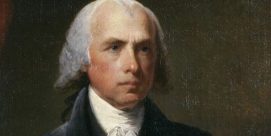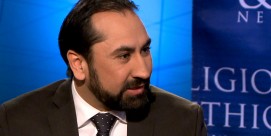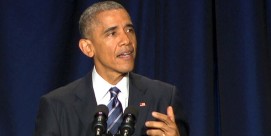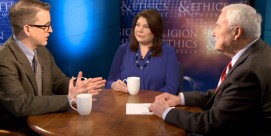Andrew Finstuen: State of the Union, Statement of Faith

President Barack Obama has faith in America. He both opened and closed his State of the Union address with remarks about his belief in the power of the American spirit, which he defined as our fundamental strength, optimism, generosity, and decency as a people and as a nation. He credited this spirit with pulling us through, among other things, the uncertainties of the Civil War, World War II, and the civil rights movement.
Many Americans share Obama’s faith in the American spirit, and thus they share in his American civil religion. Such a faith is in the tradition of the oldest political-religious narrative in American history. It is a variation on Puritan John Winthrop’s call for the settlers of colonial Massachusetts to be a “city on a hill” and a beacon to the world. Obama provided his most passionate articulation of this civil faith at the end of the speech, the only moment when the chamber fell completely silent, no doubt in homage to the “sacred” values of America. He noted that American leadership overseas “advances the common security and prosperity of all people,” and the United States takes such initiatives “because our destiny is connected to those beyond our shores. But we also do it because it is right.”
Preaching this civil faith is a part of being president, and Obama is among the few presidents to preach it with a measure of humility. Like all good preachers, he implicated himself and his party in the sins that have led to the gridlock of Washington politics, prohibited the exercise of the American spirit, and reduced the federal government to a place “where every day is Election Day.” He also distinguished himself from some of his predecessors by explaining that the greatest realizations of the American spirit came as a consequence of making sacrifices in the face of enormous crisis.
This humility notwithstanding, President Obama’s civil faith in America clouded his judgment at a crucial point in the speech. He highlighted national security as the greatest source of unity in US history and lamented that the unity achieved after 9/11 “has dissipated.” It is one thing to suggest that war and armed conflict are permanent fixtures of history, as he did in his Nobel speech. It is an altogether different thing to champion the national cohesion that comes from it. That unity ushered in two wars, costing America trillions of dollars, thousands of precious American lives, and tens or even hundreds of thousands of precious non-American lives.
This curious advocacy of the unity found in national security would have dismayed theologian Reinhold Niebuhr, whom Obama has cited routinely as a shaper of his political vision. Niebuhr was deeply suspicious of such simple unities, and he was certainly suspicious of simplistic faith in American ideals. Late in the speech, Obama expressed just such a faith: “Abroad, America’s greatest source of strength has always been our ideals. The same is true at home.” Niebuhr understood American ideals to be not only our greatest strength, but also our greatest weakness. Pride alone in these ideals, thought Niebuhr, was extremely dangerous, since “a too-confident sense of justice,” as he wrote, “always produces injustice.”
Still, after a year as president of a nation in turmoil, President Obama’s first State of the Union address makes clear that his faith in the America spirit has not been shaken. Yet based on his frequent appeals in the speech to this spirit and to the better part of our political natures—and in light of the palpable sarcasm and sneering by members of Congress on both sides of the aisle as he spoke—it appears that he can be less sure about whether or not Americans will practice their civil faith with civility.
Andrew Finstuen teaches at Pacific Lutheran University. He is the author of Original Sin and Everyday Protestants: The Theology of Reinhold Niebuhr, Billy Graham, and Paul Tillich in an Age of Anxiety (University of North Carolina Press, 2009)







